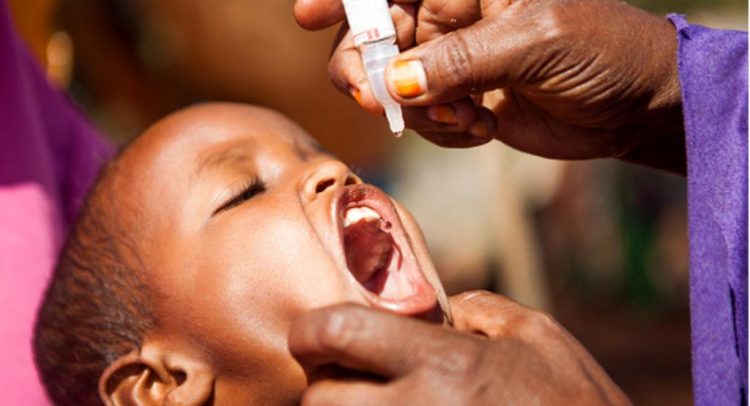A child receiving the oral polio vaccine.
The Ghana Health Service (GHS) will from Thursday, September 10, commence the mass immunization of children under five years against the non-wild strain of polio type two virus also called circulating Vaccine-Deprived Polio Virus Type 2 (cVDPV2).
The sub-national vaccination campaign, initially suspended in March due to Covid-19, has been re-introduced following the detection of 31 cases of (cVDPV2) in the country from July to date.
The exercise is expected to last till September 13, for the first round, and has a target of reaching 4.6 million children in eight regions with the second round scheduled from October 8 to 11.
Director-General of the GHS, Dr. Patrick Kuma-Aboagye, said although Africa has been certified to be free from wild polio, the detection of 31 cases of the cVDPV2 in the country, meant it had become necessary to vaccinate the most vulnerable population, who are children under five.
Dr. Kuma-Aboagye explained that following the national and global eradication of the type two wild polio virus of the three stereotypes in 2015, Ghana joined the global community to switch from the vaccine it was using at the time, known as the trivalent oral polio vaccine (tOPV), introduced in 1978 and which provided protection or immunity for all three polio viruses, to one that provided immunity for types one and three.
Those vaccines were referred to as the bivalent oral polio vaccine (bOPV) and the inactivated polio vaccine (IPV), respectively, because they proved to be more effective, he said.
He noted that some 2.4 million children born between January 2016 and February 2018, in particular, were therefore not exposed to the polio type 2 vaccine due to the switch in the polio vaccine during that period.
“It has, therefore, become necessary that all children who have missed any of the polio vaccinations be vaccinated to help boost the national immunity against polio, prevent a retrogression of the gains made, as well as break further transmission of the non-wild polio in the country,” he said.
Dr. Kwame Amponsa-Achiano, programme manager of the Extended Programme on Immunization (EPI), said the mass campaign is to help avoid eroding the gains made over the years which led to organisations such as the World Health Organisation declaring Ghana polio-free in 2015.
He gave an assurance that the vaccine was very safe and posed no life threats to children and, therefore, appealed to parents to allow their children to be vaccinated to protect them from death or permanent disability.
“If a population is fully immunized, they will be protected against all forms of polioviruses,” he said.
By Jamila Akweley Okertchiri

